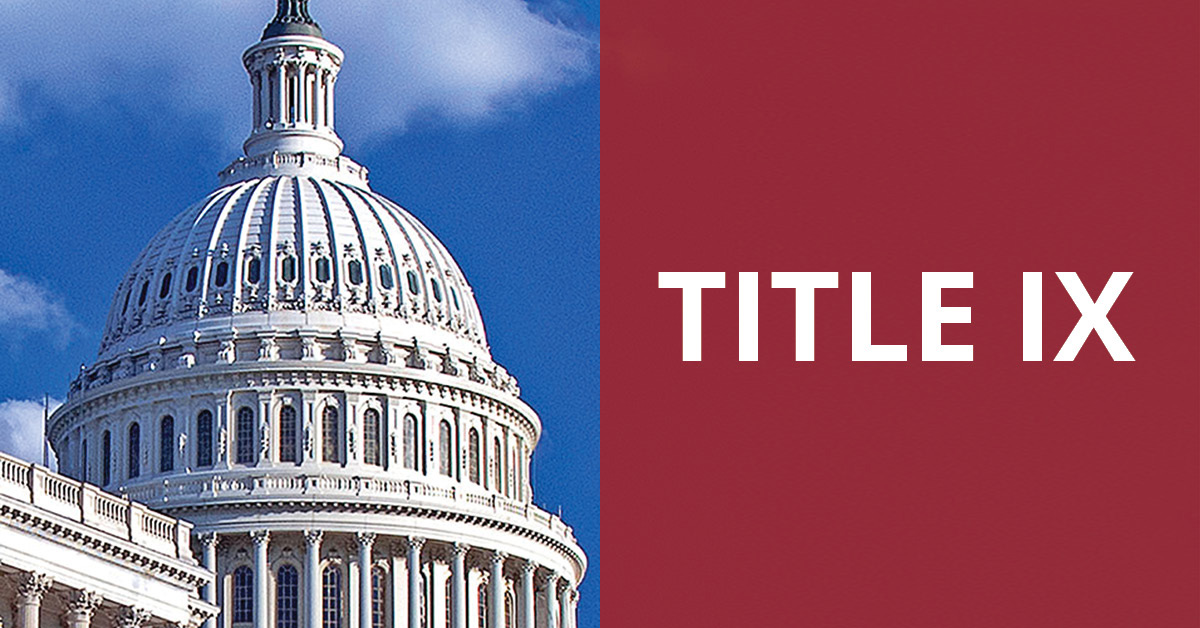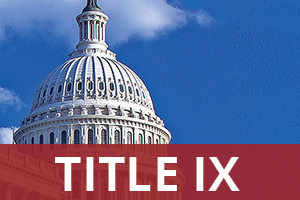by CUPA-HR | June 17, 2024
Updates:
On June 17, a federal judge in the Eastern District Court of Kentucky issued a second preliminary injunction against the Title IX rule, blocking the final rule from taking effect on August 1 in Virginia, Kentucky, Tennessee, Indiana, Ohio and West Virginia.
On June 24, the Biden administration filed a notice of appeal for the preliminary injunction granted in the Western District Court of Louisiana to block the Title IX final rule from going into effect on August 1, 2024. The appeal will be filed in the 5th U.S. Circuit Court of Appeals. The preliminary injunction remains in effect until the 5th Circuit Court issues a decision. CUPA-HR will keep members apprised of any updates on this appeal as well as the status of the second preliminary injunction granted in the Eastern District Court of Kentucky.
On July 2, a federal judge in the U.S. District Court of Kansas issued a third preliminary injunction to block the Biden administration’s Title IX rule from taking effect on August 1. The preliminary injunction applies to four states: Alaska, Kansas, Utah and Wyoming. The preliminary injunction also applies to schools where members of the Young America’s Foundation, Female Athletes United, and Moms for Liberty attend, even if the state in which the school is located is not challenging the rule or is not included in another preliminary injunction. The Title IX rule is now blocked from being enforced beginning on August 1 in a total of 14 states, as well as over 360 institutions in 24 states, Washington D.C., and Puerto Rico that are not suing the Biden administration over the Title IX rule.
On July 11, Republicans in the U.S. House of Representatives passed a Congressional Review Act resolution to block the Department of Education from implementing and enforcing its Title IX final rule. The vote is largely symbolic as the Democrat-controlled Senate is unlikely to take up the measure and President Biden would veto the resolution if it ended up on his desk.
On July 11, a federal judge in the Northern District Court of Texas granted a fourth preliminary injunction to block the Title IX final rule from taking effect on August 1 in the state of Texas. The Title IX final rule is now blocked from taking effect in 15 states.
On July 24, a federal judge from the Eastern District Court of Missouri issued another preliminary injunction to block the Title IX rule from taking effect in six more states. The states included in this decision were Arkansas, Missouri, Iowa, Nebraska, North Dakota, and South Dakota. The Title IX final rule is now blocked from taking effect on August 1 in a total of 21 states.
On July 31, a federal judge in the Western District Court of Oklahoma granted a preliminary injunction to block the Title IX final rule from taking effect on August 1. Additionally, the 11th U.S. Circuit Court of Appeals granted a preliminary injunction in Alabama, Florida, Georgia, and South Carolina, overturning a lower court’s previous decision to deny the preliminary injunction in those states. There are 26 states in which the Title IX rule is now blocked from taking effect on August 1.
On June 13, a federal judge in the Western District Court of Louisiana issued a preliminary injunction on the Department of Education (ED)’s recent Title IX final rule. The order blocks the final rule from taking effect on August 1 in Louisiana, Mississippi, Montana and Idaho until a final decision has been issued by the judge on a lawsuit challenging the validity of the final rule.
ED’s Final Rule and Subsequent Lawsuits
In April, ED released its highly anticipated final rule to amend the Title IX regulations. Notably, the final rule expands protections against sex-based discrimination to cover sexual orientation, gender identity, and pregnancy or related conditions. Soon after it was published, several lawsuits were filed by states and advocacy groups challenging ED’s decision to expand Title IX protections to include gender identity and sexual orientation.
Judge’s Order
In the order to grant a preliminary injunction, the federal judge asserted that the Title IX rulemaking is “contrary to law” and “exceeds statutory authority,” especially with the expanded protections for transgender students. Specifically, the judge explained that Congress intended to protect biological women from discrimination when enacting Title IX, and that “enacting the changes in the final rule would subvert the original purpose of Title IX.”
As a result, ED is blocked from enforcing the final rule in the four states listed in the order, and the final rule will not take effect on August 1 in those four states until further orders are issued by the court.* The judge will now consider the lawsuit challenging the final rule and decide to either uphold or strike down the rule. A final decision may take months or a year or more to be released, as any decision is likely to be appealed to a higher court. In the meantime, CUPA-HR encourages HR leaders in the states impacted by this preliminary to work with their institution’s general counsel on best practices for navigating Title IX compliance.
CUPA-HR will keep members apprised of additional updates on the legal challenges against the Title IX final rule.
* Over two dozen states have joined lawsuits challenging the Title IX final rule. Though the order in this blog post applies only to Louisiana, Mississippi, Montana and Idaho, decisions for the additional lawsuits could result in similar injunctions for other states.
Share This Article:



